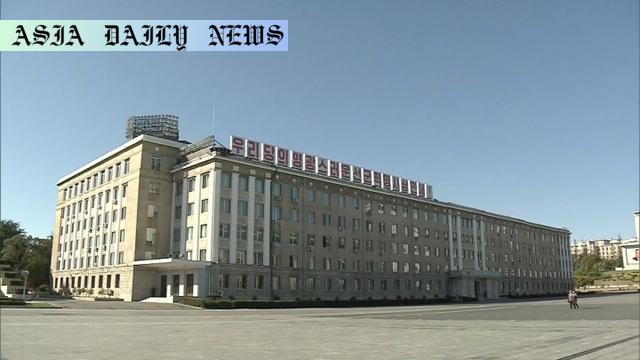North Korea’s foreign ministry criticizes US for recent attacks, claiming they violate territorial integrity and global security interests.
North Korea’s foreign ministry strongly opposes US military actions in Iran.
Criticism highlights violations of Iran’s territorial sovereignty and security.
Concerns raised about escalating Middle East tensions and global stability.

Strong Allegations of Sovereignty Violations
In a bold statement issued through state-run media, North Korea’s foreign ministry has sharply criticized the United States for its recent military strikes on nuclear sites in Iran. A ministry spokesperson denounced these actions as a blatant violation of Iran’s territorial integrity and an attack on its security. The official remarked on the potentially destructive consequences of such behavior, calling it an aggressive misuse of military power thinly veiled under pretexts such as ‘peacekeeping’ and ‘threat removal.’ Such actions, North Korea argued, not only disregard international norms but embolden geopolitical instability in the Middle East.
The statement highlighted the long-standing alliance between North Korea and Iran, underscoring their shared resistance to Western domination and particularly their anti-US sentiment. These comments represent a continuation of North Korea’s propensity to align itself with nations opposed to American policies, reflecting a broader effort to cement international solidarity against what it perceives as unilateral and aggressive military interventions by the US.
Calls for Global Rejection of US Actions
North Korea didn’t stop at merely condemning the US actions—it called upon the international community to raise their voices collectively against what it described as ‘unlawful aggression’ in the Middle East. By urging ‘unanimous censure and rejection,’ North Korea positioned itself as a vocal advocate for what it perceives as global justice and fairness.
The statement pointed fingers not only at the United States but also at its close ally, Israel, accusing both nations of perpetuating a dangerous precedent of disregarding other nations’ sovereignty in favor of military dominance. The spokesperson stressed the importance of respecting national boundaries and security interests while promoting international peace and cooperation. For a nation often accused of undermining regional stability itself, such calls from North Korea may appear paradoxical, yet they highlight the regime’s attempt to rally opposition to American foreign policies globally.
Escalating Tensions in the Middle East
The Middle East, already a hotbed of geopolitical tensions, is witnessing a worsening crisis following the recent strikes in Iran. North Korea warned that these actions exacerbate regional instability, making the prospects for peace and security even more elusive. The foreign ministry highlighted the ‘serious negative consequences’ of policies that fail to account for long-term repercussions, both regionally and globally.
Furthermore, the North highlighted how such aggressive actions not only affect the Middle East but also shake the global security structure. The ongoing use of force under dubious pretexts, it warned, sets a precedent for future conflicts that could threaten global peace. This perspective suggests that North Korea is attempting to position itself as a responsible player on the international stage, despite its isolated status and contentious history with nuclear proliferation.
North Korea’s Historic Ties with Iran
North Korea and Iran share a long-standing, yet unusual alliance founded on mutual opposition to US hegemony. Both nations have faced intense sanctions and international criticism for their respective nuclear programs, fostering a sense of solidarity in their geopolitical struggles. Their relationship extends beyond mere rhetoric, encompassing various forms of cooperation, including technology exchanges and diplomatic support.
In this context, North Korea’s criticism of US actions in Iran can also be seen as a broader defense of its own sovereignty and regional policies. By strongly aligning itself with Iran, North Korea seeks not only to bolster its anti-US stance but also to reaffirm its position as a key player among nations resisting Western influence.



Commentary
North Korea’s Response: A Calculated Move?
North Korea’s condemnation of US military actions in Iran is more than just a predictable response from a nation with an entrenched anti-US stance. By speaking out, North Korea strengthens its ties with Iran and enhances its image as an advocate for sovereign rights, especially among nations critical of Western policies. These moves merit deeper analysis, particularly because they reflect Pyongyang’s consistent strategy of aligning itself with nations facing American pressures. This alignment not only helps North Korea diplomatically but also allows it to project a sense of shared struggle against perceived imperialist aggression.
Global Implications of Recent Developments
The situation goes beyond mere rhetoric. North Korea’s response underscores the potential for such actions to influence global alliances. By emphasizing territorial sovereignty and rejecting unilateral interventions, North Korea is attempting to challenge the global narrative that the United States and its allies are acting as global peacekeepers. This could resonate with nations that have faced military or economic pressure from larger powers, creating opportunities for Pyongyang to bolster its geopolitical influence.
A Nuanced Takeaway
While North Korea’s criticism of US actions may seem predictable, its messaging carries nuanced undertones. It underscores Pyongyang’s ability to adapt its rhetoric to align with international diplomatic trends. However, it also reflects the challenges of global diplomacy, where nations like North Korea attempt to unify opposition against dominant powers. Ultimately, the international community must carefully navigate these developments, recognizing both the underlying motivations and the broader implications for global peace and security.